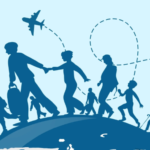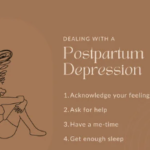Migration is one of the most significant global trends in today’s world. Driven by the search for better opportunities—whether in education, career, or healthcare—many Nigerians and other Africans have chosen to relocate to countries with seemingly better prospects. The promise of prosperity abroad is often irresistible, but there’s a crucial aspect that many overlook: mental health.
Too often, people focus only on the tangible opportunities they believe migration will provide, forgetting about the emotional and psychological challenges that come with it. If you’re considering migrating or “Japa” (a popular Nigerian slang for migration), it’s essential to ask yourself: how prepared are you?
But, if you’re moving with a family, especially with a child who has special needs like autism, the preparation goes beyond financial or logistical factors. The journey of migration can be emotionally draining, especially if you are not adequately prepared for the mental health challenges that may arise.
When migrating, it’s important to remember the insights shared by Alegria, Alverez and DiMarzio (2017) in their discussion on “Immigration and Mental Health“. They note that factors like family and neighborhood, social position, support or exclusion, language skills, and experiences with discrimination and stress all affect how immigration impacts mental health.
Never underestimate the complex intersection of autism, migration, and mental health. Before migrating, many assume that relocating to a new country will provide better resources and opportunities for both themselves and their children with special needs. However, what is often overlooked is the emotional and psychological strain that migration can bring.
The culture shock, feelings of isolation, and a lack of local understanding of autism in the new environment can profoundly impact your mental health. This experience is shared by many people who migrate abroad, serving as a stark reminder that, when migration is unplanned or unsupported, it can disrupt not only financial stability but also emotional well-being and family dynamics.
The Unseen Impact of Migration on Mental Health
While migration offers the possibility of economic success, it also brings significant emotional challenges that are often downplayed or ignored. Research has shown that migration can lead to increased mental health issues such as anxiety, depression, and stress.
According to a study by the International Organization for Migration (IOM), migrants often face heightened vulnerability due to cultural shock, discrimination, and social isolation in their new countries. The loss of social networks, support systems, and familiar routines can further exacerbate these challenges, especially when moving to a country with cultural differences.
For some, migration is a balancing act between the hope for a better future and the harsh reality of adjusting to a new life. The emotional rollercoaster of living in a foreign country—along with the uncertainty of finding appropriate care for a child with autism—can be mentally taxing. Never forget that.
Often, migrants fail to realize that the process of adaptation to a new environment can be psychologically destabilizing, not just for the parents but for the children as well.
When you migrate, your entire life changes. You leave behind the familiar comforts of home, and in return, you face the challenge of integrating into a new society. Whether it’s dealing with the alienation of being in a new cultural space or struggling to make new friends, this feeling of isolation is real.
Families with special needs children face even greater challenges. Many in the diaspora community have shared their experiences, highlighting how autism awareness and support systems in other countries often fall short or differ significantly from what they’re used to at home.
The Importance of Mental Health Preparation Before, During, and After Migration
Before you pack your bags, it’s essential to understand that migration is not a one-size-fits-all solution. The pre-migration phase is arguably the most important step when it comes to mental health preparation. Families—especially those raising children with autism or other special needs need to plan adequately. The first step is setting realistic expectations. While moving to a new country may seem like a quick fix, it’s important to remember that your mental health may not immediately improve just because your surroundings do. It’s vital to factor in the potential emotional and psychological costs that could come with the move.
Mental health preparation should be part of your pre-migration checklist. If you’re moving with a child with autism, do thorough research on the healthcare and educational systems in your destination country.
- Are there adequate resources for children with special needs?
- Are there autism-friendly schools and therapists available?
Drawing from Adeola’s experience working with immigrant families, she often encourages people to consider these questions, as the lack of proper services can make the transition even more challenging.
During migration, the adjustment phase can be overwhelming. Navigating the new systems of a foreign country—whether it’s healthcare, schools, or even understanding how to access social services—can lead to frustration, confusion, and anxiety.
How to Japa with Mental Health in Mind
If you’re preparing to “Japa,” you need to take proactive steps to safeguard your mental health. Here’s how:
- Seek Professional Counseling Before You Leave: Migrants should consider speaking to a mental health professional before they migrate to set expectations and manage anxiety. This is particularly important for those with special needs children. Counseling can also help individuals learn coping mechanisms for handling the stresses of migration.
- Do Your Research: Learn about the mental health services, autism resources, and social support structures in your new country. Don’t just focus on finding a job or a school for your child. Investigate whether there are autism-friendly programs and community groups to help ease the transition.
- Build Social Support Networks Early: Before you leave, connect with local communities in your destination country. Join online forums or Facebook groups where other immigrants, especially those with children with autism, can offer support and advice. Creating connections early can ease the feeling of isolation once you arrive.
- Take Care of Your Family Dynamics: Migration can strain family relationships, especially if the adjustment process is difficult. Regularly check in with your family members to make sure everyone is coping with the changes. Couples should maintain open communication and support each other through the process.
The Role of Governments and Healthcare Providers
Governments and NGOs must play a critical role in easing the mental health challenges faced by migrants. According to the World Health Organization (WHO), mental health services should be accessible to all, including migrants, who may experience higher levels of stress, trauma, and mental health issues due to their displacement.
Healthcare providers must be culturally competent and understand the unique challenges that migrants, particularly those with special needs, face.
Conclusion: Japa with Preparation
Migration can be a life-changing experience, but it’s essential to go into it with proper preparation—not just financially, but emotionally. Migration may offer hope for better opportunities, it can also present mental health challenges that need to be planned for.
By understanding the full scope of the migration experience—before, during, and after—and prioritizing mental health, you can ensure a smoother transition. The goal should not be just to relocate but to thrive in your new environment, mentally, emotionally, and as a family.
In the end, “Japa with preparation” isn’t just about securing a better life abroad—it’s about preparing your mind and your heart for the journey ahead.
Author : Dr. Adeola D. Folorunso
References
Alegría M, Álvarez K, DiMarzio K. Immigration and Mental Health. Curr Epidemiol Rep. 2017 Jun;4(2):145-155. doi: 10.1007/s40471-017-0111-2. Epub 2017 Apr 22. PMID: 29805955; PMCID: PMC5966037.
International Organization for Migration (2017). Principles and Guidelines Supported by Practical Guidiance on Human Rights Protection og Migrants in Vulnerable Situations. Available from : chrome extension://efaidnbmnnnibpcajpcglclefindmkaj/https://www.ohchr.org/sites/default/files/Documents/Issues/Migration/PrinciplesAndGuidelines.pdf.




















2 Responses
Outstanding take! The Sprunki Retake platform transforms creativity. Sprunki Retake offers unprecedented creative potential in composition. The possibilities that Sprunki Retake enables are extraordinary.
Incredible innovation! The AI Tools are transforming the way we work. These AI Tools are a testament to the power of innovation, streamlining workflows.